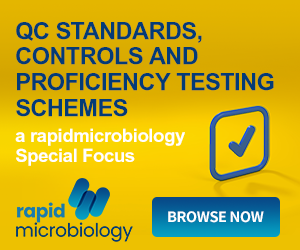Minimising Microbial Risks in Infant Milk Formula
| Dr Steven Forsythe's research group at Nottingham Trent University is investigating how quickly Enterobacteriaceae such as Salmonella, Enterobacter sakazakii, Escherichia coli, Klebsiella pneumonia and Citrobacter freundii can grow in reconstituted powdered infant formula. In order to study the growth rates of these organisms over a range of temperatures, they are using the Rapid Automated Bacterial lmpedance Technique (RABIT) from Don Whitley Scientific. The bacteria Salmonella and Enterobacter sakazakii have been associated with illness attributed to powdered infant formula. Enterobacter sakazakii is associated with infection of immuno-compromised individuals, especially newborn babies. As cases have been associated with contaminated powdered infant formula, the European Food Safety Authority's (EFSA) Scientific Panel on Biological Hazards cites Enterobacter sakazakii and Salmonella as the pathogens of greatest concern. Although infections with these bacteria from formula milk are relatively rare, powdered infant formula is not sterile and microbial contamination can cause serious illness. In December 2006, the Department of Health (DH) and the Food Standards Agency (FSA) issued revised guidance for health professionals on the safe preparation, storage and handling of powdered infant formula milk to reduce these risks. Good hygiene practices are essential in preparing and storing feeds made from powdered formula. EFSA, DH and the FSA recommend allowing boiled water to cool to no less than 70°C, which in practice means using water that has been covered for less than 30 minutes after boiling. After reconstitution, the powdered infant formula should be cooled to an appropriate feeding temperature. It is recommended that feeds are used within two hours of preparation, as the length of time for which reconstituted formula is stored increases the risk of bacterial growth and therefore infection. In order to further refine advice regarding the microbiological safety of powdered infant formula, the FSA is supporting studies examining optimal storage times and conditions in further detail. A versatile and cost effective rapid bacterial detection method, the RABIT is used to measure changes in the culture medium's electrical conductance that occur when charged metabolites are produced by the bacteria of interest. Dr Forsythe's group is using six separate modules at different temperatures to measure samples at set time intervals over a range of dilutions. A calibration curve is produced for each organism, where the time to detection is directly proportional to the growth rate and indicative of real-time microbial activity. Allowing data export to all standard spreadsheet and database programs, the automated system's intuitive software simplifies sample entry and results analysis. Quality-assured results are available more quickly than with traditional microbiological methods, improving both sample throughput and laboratory efficiency. This approach is used in Dr Forsythe's laboratory instead of inoculating large numbers of culture plates with different incubation times and temperatures, and is much less labour intensive and less time consuming. Using the manual plate method, samples at each time point would need to be collected, diluted, plated, incubated overnight and counted the following day. Dr Forsythe's research is due to be completed in September 2008 and the final report will be available via the Agency's website (http://www.food.gov.uk) |
NOTE: This item is from our 'historic' database and may contain information which is not up to date.
Source : Don Whitley Scientific View Company Information
Posted on February 12, 2008






